In 1996, a Korean player in his 20s emerged onto the handball court in Gummersbach, a small town in central Germany. Unlike the stereotypical Asian, he was tall enough to reach 2.3 meters, with a robust frame. Armed with both agility and power despite his height, the athlete showed off unparalleled technique on the European sport scene. That’s how the legendary story of former handball player Yoon Kyung-sin got started in the Handball-Bundesliga (HBL), the top German professional handball league.
Since his 1996 debut in Germany, Yoon has set a series of records, including becoming the Top Scorer as many as eight times, as he played in a total of 12 seasons in the league, ten with Gummersbach and two in Hamburg.
In the 2000-2001 season, he scored 324 goals, reaching the highest number ever for a season, exceeding the seemingly unbreakable limit of 300 goals.
In 2001, he was chosen as Best Player of the Year by the International Handball Federation (IHF). During his time in Germany, he scored a total of 2,908 points, the highest number in league history, a record which remains unbroken.
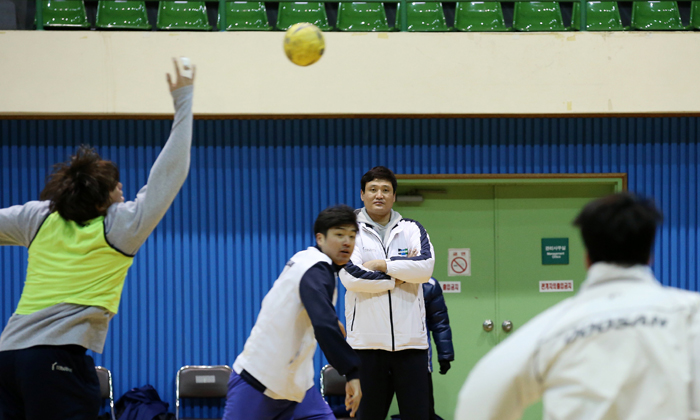
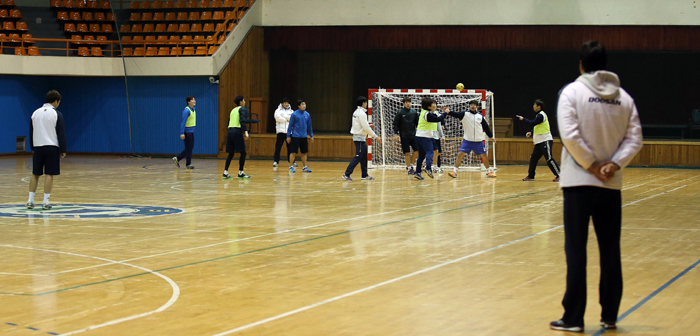
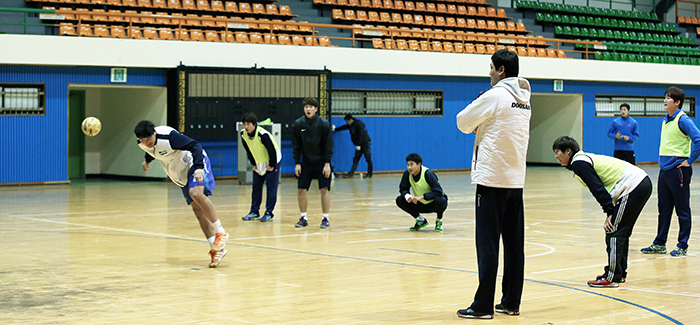
There seemed to be no match for him. He continued to develop his incomparable skills as he became Score King at the world championships in 1995 and 1997, as well as at the Athens 2004 Olympics.
Yoon also played more than 250 matches as a member of the Korean national team. He played in six Asian games, including in Beijing in 2010 and in Guangzhou in 2010. He played in a total of five Olympics from Barcelona 1992 through to London 2012 Olympics, but he missed the 1996 games in Atlanta.
In 2008, Yoon ended his 12-year career in Germany and came home. After retiring as a player, he was appointed as the new coach for the Doosan men's handball team. In his 30s now, Yoon led the Doosan team through an undefeated streak that ran until June 2013. Then just a couple of months later, in September 2013, the new coach started winning again and he has continued to keep the team in the lead, for five consecutive years.
Korea.net recently sat down with Yoon, who is now in his early 40s, to hear about his career as both a player and a coach.
* Interview with Yoon Kyung-sin
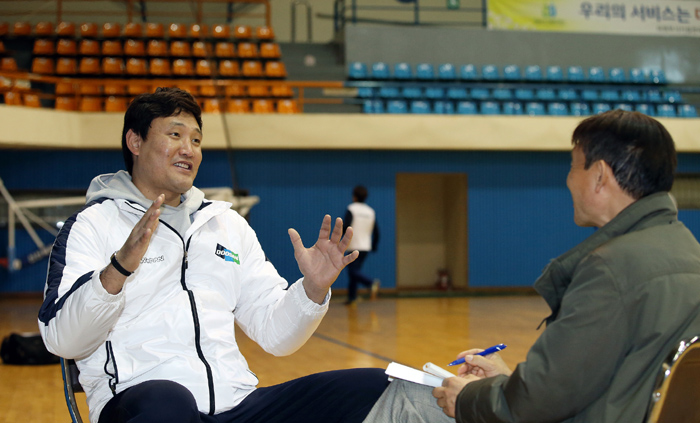
- You successfully completed your career in Germany and came back to Korea. You could be there or in other countries now, working as a coach, instead of being here. You must have received quite a number of offers. Is there any special reason that you turned them down and came back?
I got offers there. At that time, however, I had a four-year-old son and my wife felt like getting back to Korea. I had to decide whether or not to stay. In the end, I chose to come back, first for my family and, personally, as I also found it difficult having lived out of my country for that long.
- There are other ball games, like baseball and volleyball. Why handball?
It started when I was in my fourth year at Seoul Soongin Elementary School. I took a handball class as part of the school’s extracurricular activities. When I first touched a handball, a ball smaller than a basketball or football and bigger than a baseball or a ping-pong ball, my curiosity kicked in. I just loved it. Playing with the unique and unfamiliar size of the ball interested me.
I moved to the Seoul Soongduck Elementary School, a school that then created its own handball team. Ball games like basketball and volleyball were sports familiar to the public, but handball was quite unknown back then. So I felt curious about what it really was.
When I told my parents that I wanted to play the sport, they opposed it. Later, I found that my mother, too, used to be a goalkeeper on a handball team. She tried to persuade me to not take up the arduous sport.
- Do the records you set in Germany still stand?
I scored 2,908 goals over my career there, making me the league’s top scorer. I feel a bit sorry that I was unable to reach the 3,000 mark, though. I believe the record I set will be difficult to break.
- You’re in good physical condition. Does it run in the family?
Yes. Both of my parents are quite tall. My father is 181 centimeters and my mom is 170 centimeters. My older sister is 175 centimeters tall. My younger brother was a Doosan handball player, too, even though he retired due to injuries.
All my family members have a good and strong physique. As I, too, have a strong frame by nature, I did not yield at all in the fights against bulky players that take place during a game. I didn’t suffer that many injuries. Thanks to a natural strong physique, I was able to run on the global court for that long, I think.
- How did you become associated with the Gummersbach team? What’s the way in which locals in the town view the sport and the team?
When I was in my third year of college, I had the chance to play as a national player at the 1995 Handball World Championship in Iceland. At that time, the Gummersbach team was competing in the matches. Its officials saw me play. I'm sure that it was like an adventure for them to scout an Asian, all the more, a Korean. However, since I was still young, they chose me. Actually, one of my goals was to play on the European scene, more specifically, in the German court. The vague dream suddenly came true. I said yes right away, not caring about how much I would get paid. I remember I said, “I undoubtedly will go.”
Gummersbach is a very small city with a very small population. That’s why you can see how much the public loves the sport. The handball system and the professional league are well-equipped across the region.
At first, I had difficulties getting used to the new environment. The most difficult part was communicating with others. As I didn’t speak any German, I couldn’t have other players or coaches understand how well I felt or what I wanted to say. Support and love from German fans, however, cheered me up. Some fans even made kimchi for me. You cannot expect their kimchi to taste as good as original kimchi, but I am quite moved by the sincere present. I first felt that Germans sounded a bit blunt, but as time went by, I built strong ties with them. In a word, they are loyal. They never turn away from you once they get to like and trust you. Support from middle-aged or elderly fans, in particular, is something that I will never forget.
Worries about language barriers were soon gone, as my colleagues and I tried to understand each other and tried to learn the different cultures we all had. We soon got close. Four years into my time in the city, I got better at speaking German. As they understood my errors, I got more confident in speaking the language. I think I was lucky to have good people around me.
- When was the most memorable moment in your career?
It was when my German team defeated the unshakable top team for many years at the European Handball Federation (EHF) Champions Cup in 2007. Also, I was really moved when I retired from the Gummersbach team. At the retirement ceremony, more than 20,000 local fans came to say goodbye to me. I was chocked up to see that many fans supporting me. I still keep in touch with some German fans via SNS. Some German fans flew to watch me play on my home turf. About 10 fans even came to my wedding. I am so thankful to all of them.
- You wrote a doctoral thesis at Kyung Hee University, a thesis that focused on “Leadership, Players’ Self-Management and Team Culture.” What do you think creates ideal leadership?
It’s not that simple to define which style of leadership is right or not. The most important thing in leadership is how to communicate with players and how to read their minds. At the same time, you should retain charismatic leadership on the court. As a coach, I still have a long way to go, and keep working to become as best as I can be.
Most of the players I work with have been put under a great amount of pressure from their coaches ever since they were in middle and high school, as I experienced myself. Now, however, I give them more time to think and study ways to upgrade their skills on their own, instead of just being harsh on them. Just doing as you're told is nothing but robotic. Before a coach can come out and tell them to do this or that, they discuss it amongst themselves and put forth their own ideas. That kind of free, self-reliant environment is what I want to create. I know it’s easier said than done. I keep working hard to make it happen and I can see some changes. That’s what I think ideal leadership is all about.
- We heard that you look at Heiner Brandt, the former coach of the Gummersbach team, as your role model. What are the things about him that inspired you?
He was the first coach of the German team. He often had me over for dinner and tried to talk with me using a Korean-German dictionary. He was like a kind uncle next door. He was very kind and gentle, but when he switched to being a coach, he was a bit pushy.
I was really impressed by such a professional role. In professional leagues on the European scene, there was zero tolerance toward any mistakes or impudent manner. You should feel free and at the same time are compelled to stick to certain rules.
In that sense, courteousness and the modest attitude I kept ever since my childhood really helped. I think the organizational culture in Germany and my traditional etiquette influenced by Confucian culture worked in harmony.
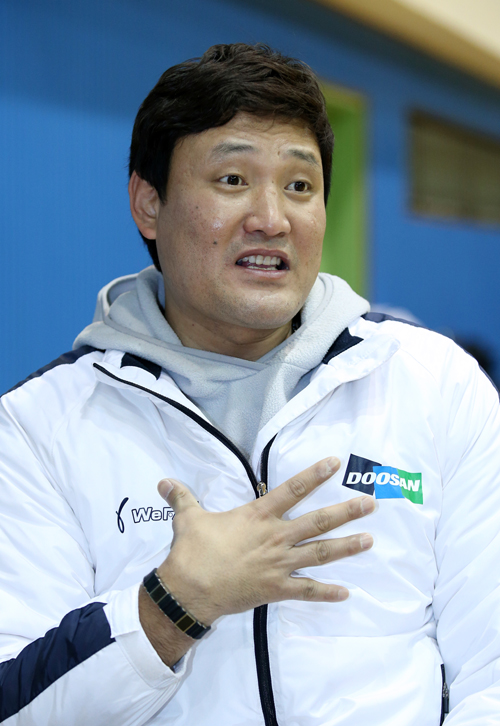
- What do you think are the charms of the sport?
I think the charms of the sport are its speed and physical requirements. Handball is one of the fiercest sports and you need to be agile and get involved in constant physical fights against your opponents.
Not to be outdone in the physical fights, I gained more than 10 kilograms in Germany, weighing in at 110 kilograms. Handball players get into psychological warfare with each other, too. Then it grows into physical fights. Those who I fought against are now my good friends. The sport has brought me a lot of good friends. Sometimes, I meet some of them at international competitions, who are now working as a coach, like me. After the competition, we talk about the good old days over a beer. I have friends in many countries. If I’d played just at home, I would never have had such good friends.
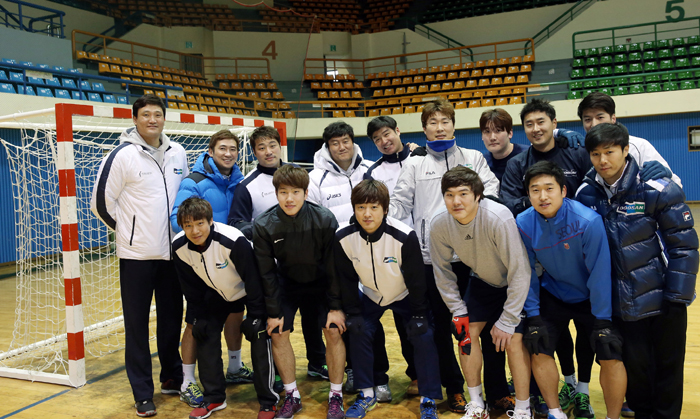
- What does handball mean to you?
It’s my life. It’s something that I still work for and something that makes me feel alive. It represents my life. Doing this job, I felt a range of emotions. I felt happy and delightful. Sometimes, I got angry and shed tears. My handball life is still ongoing. I still have a lot of things to do with it. I hope to keep this good image of the sport until I stop doing this.
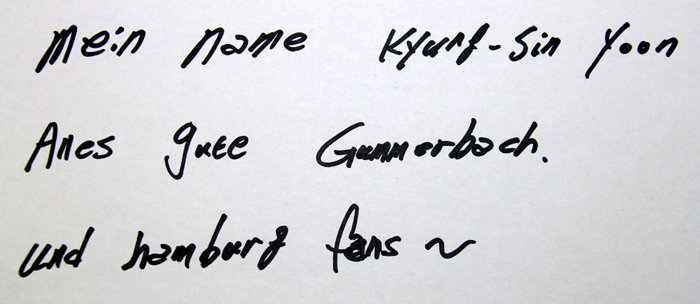
By Wi Tack-whan, Sohn JiAe
Korea.net Staff Writers
Photos: Jeon Han
whan23@korea.kr
Since his 1996 debut in Germany, Yoon has set a series of records, including becoming the Top Scorer as many as eight times, as he played in a total of 12 seasons in the league, ten with Gummersbach and two in Hamburg.
In the 2000-2001 season, he scored 324 goals, reaching the highest number ever for a season, exceeding the seemingly unbreakable limit of 300 goals.
In 2001, he was chosen as Best Player of the Year by the International Handball Federation (IHF). During his time in Germany, he scored a total of 2,908 points, the highest number in league history, a record which remains unbroken.



Former handball player Yoon Kyung-sin, currently coach for the Doosan Men’s Handball team, watches as his players train at the Uijeongbu Sports Complex in Gyeonggi-do (Gyeonggi Province).
There seemed to be no match for him. He continued to develop his incomparable skills as he became Score King at the world championships in 1995 and 1997, as well as at the Athens 2004 Olympics.
Yoon also played more than 250 matches as a member of the Korean national team. He played in six Asian games, including in Beijing in 2010 and in Guangzhou in 2010. He played in a total of five Olympics from Barcelona 1992 through to London 2012 Olympics, but he missed the 1996 games in Atlanta.
In 2008, Yoon ended his 12-year career in Germany and came home. After retiring as a player, he was appointed as the new coach for the Doosan men's handball team. In his 30s now, Yoon led the Doosan team through an undefeated streak that ran until June 2013. Then just a couple of months later, in September 2013, the new coach started winning again and he has continued to keep the team in the lead, for five consecutive years.
Korea.net recently sat down with Yoon, who is now in his early 40s, to hear about his career as both a player and a coach.
* Interview with Yoon Kyung-sin

Former handball player Yoon Kyung-sin (left), now serving as a coach for the Doosan men’s handball team, talks about his life dedicated to the sport.
- You successfully completed your career in Germany and came back to Korea. You could be there or in other countries now, working as a coach, instead of being here. You must have received quite a number of offers. Is there any special reason that you turned them down and came back?
I got offers there. At that time, however, I had a four-year-old son and my wife felt like getting back to Korea. I had to decide whether or not to stay. In the end, I chose to come back, first for my family and, personally, as I also found it difficult having lived out of my country for that long.
- There are other ball games, like baseball and volleyball. Why handball?
It started when I was in my fourth year at Seoul Soongin Elementary School. I took a handball class as part of the school’s extracurricular activities. When I first touched a handball, a ball smaller than a basketball or football and bigger than a baseball or a ping-pong ball, my curiosity kicked in. I just loved it. Playing with the unique and unfamiliar size of the ball interested me.
I moved to the Seoul Soongduck Elementary School, a school that then created its own handball team. Ball games like basketball and volleyball were sports familiar to the public, but handball was quite unknown back then. So I felt curious about what it really was.
When I told my parents that I wanted to play the sport, they opposed it. Later, I found that my mother, too, used to be a goalkeeper on a handball team. She tried to persuade me to not take up the arduous sport.
- Do the records you set in Germany still stand?
I scored 2,908 goals over my career there, making me the league’s top scorer. I feel a bit sorry that I was unable to reach the 3,000 mark, though. I believe the record I set will be difficult to break.
- You’re in good physical condition. Does it run in the family?
Yes. Both of my parents are quite tall. My father is 181 centimeters and my mom is 170 centimeters. My older sister is 175 centimeters tall. My younger brother was a Doosan handball player, too, even though he retired due to injuries.
All my family members have a good and strong physique. As I, too, have a strong frame by nature, I did not yield at all in the fights against bulky players that take place during a game. I didn’t suffer that many injuries. Thanks to a natural strong physique, I was able to run on the global court for that long, I think.
- How did you become associated with the Gummersbach team? What’s the way in which locals in the town view the sport and the team?
When I was in my third year of college, I had the chance to play as a national player at the 1995 Handball World Championship in Iceland. At that time, the Gummersbach team was competing in the matches. Its officials saw me play. I'm sure that it was like an adventure for them to scout an Asian, all the more, a Korean. However, since I was still young, they chose me. Actually, one of my goals was to play on the European scene, more specifically, in the German court. The vague dream suddenly came true. I said yes right away, not caring about how much I would get paid. I remember I said, “I undoubtedly will go.”
Gummersbach is a very small city with a very small population. That’s why you can see how much the public loves the sport. The handball system and the professional league are well-equipped across the region.
At first, I had difficulties getting used to the new environment. The most difficult part was communicating with others. As I didn’t speak any German, I couldn’t have other players or coaches understand how well I felt or what I wanted to say. Support and love from German fans, however, cheered me up. Some fans even made kimchi for me. You cannot expect their kimchi to taste as good as original kimchi, but I am quite moved by the sincere present. I first felt that Germans sounded a bit blunt, but as time went by, I built strong ties with them. In a word, they are loyal. They never turn away from you once they get to like and trust you. Support from middle-aged or elderly fans, in particular, is something that I will never forget.
Worries about language barriers were soon gone, as my colleagues and I tried to understand each other and tried to learn the different cultures we all had. We soon got close. Four years into my time in the city, I got better at speaking German. As they understood my errors, I got more confident in speaking the language. I think I was lucky to have good people around me.
- When was the most memorable moment in your career?
It was when my German team defeated the unshakable top team for many years at the European Handball Federation (EHF) Champions Cup in 2007. Also, I was really moved when I retired from the Gummersbach team. At the retirement ceremony, more than 20,000 local fans came to say goodbye to me. I was chocked up to see that many fans supporting me. I still keep in touch with some German fans via SNS. Some German fans flew to watch me play on my home turf. About 10 fans even came to my wedding. I am so thankful to all of them.
- You wrote a doctoral thesis at Kyung Hee University, a thesis that focused on “Leadership, Players’ Self-Management and Team Culture.” What do you think creates ideal leadership?
It’s not that simple to define which style of leadership is right or not. The most important thing in leadership is how to communicate with players and how to read their minds. At the same time, you should retain charismatic leadership on the court. As a coach, I still have a long way to go, and keep working to become as best as I can be.
Most of the players I work with have been put under a great amount of pressure from their coaches ever since they were in middle and high school, as I experienced myself. Now, however, I give them more time to think and study ways to upgrade their skills on their own, instead of just being harsh on them. Just doing as you're told is nothing but robotic. Before a coach can come out and tell them to do this or that, they discuss it amongst themselves and put forth their own ideas. That kind of free, self-reliant environment is what I want to create. I know it’s easier said than done. I keep working hard to make it happen and I can see some changes. That’s what I think ideal leadership is all about.
- We heard that you look at Heiner Brandt, the former coach of the Gummersbach team, as your role model. What are the things about him that inspired you?
He was the first coach of the German team. He often had me over for dinner and tried to talk with me using a Korean-German dictionary. He was like a kind uncle next door. He was very kind and gentle, but when he switched to being a coach, he was a bit pushy.
I was really impressed by such a professional role. In professional leagues on the European scene, there was zero tolerance toward any mistakes or impudent manner. You should feel free and at the same time are compelled to stick to certain rules.
In that sense, courteousness and the modest attitude I kept ever since my childhood really helped. I think the organizational culture in Germany and my traditional etiquette influenced by Confucian culture worked in harmony.

Doosan handball team coach Yoon Kyung-sin says, 'Handball represents my whole life. Doing that, I felt a range of emotions, from happiness and delight to anger and sorrow.'
- What do you think are the charms of the sport?
I think the charms of the sport are its speed and physical requirements. Handball is one of the fiercest sports and you need to be agile and get involved in constant physical fights against your opponents.
Not to be outdone in the physical fights, I gained more than 10 kilograms in Germany, weighing in at 110 kilograms. Handball players get into psychological warfare with each other, too. Then it grows into physical fights. Those who I fought against are now my good friends. The sport has brought me a lot of good friends. Sometimes, I meet some of them at international competitions, who are now working as a coach, like me. After the competition, we talk about the good old days over a beer. I have friends in many countries. If I’d played just at home, I would never have had such good friends.

Coach Yoon Kyung-sin (left) and his Doosan Men’s Handball team
- What does handball mean to you?
It’s my life. It’s something that I still work for and something that makes me feel alive. It represents my life. Doing this job, I felt a range of emotions. I felt happy and delightful. Sometimes, I got angry and shed tears. My handball life is still ongoing. I still have a lot of things to do with it. I hope to keep this good image of the sport until I stop doing this.

Yoon Kyung-sin sends a handwritten message in German to wish all the fans of Gummersbach and Hamburg good luck.
By Wi Tack-whan, Sohn JiAe
Korea.net Staff Writers
Photos: Jeon Han
whan23@korea.kr